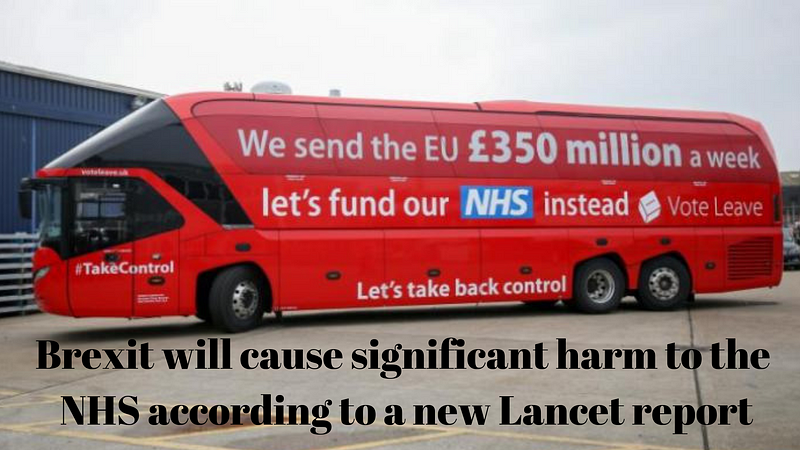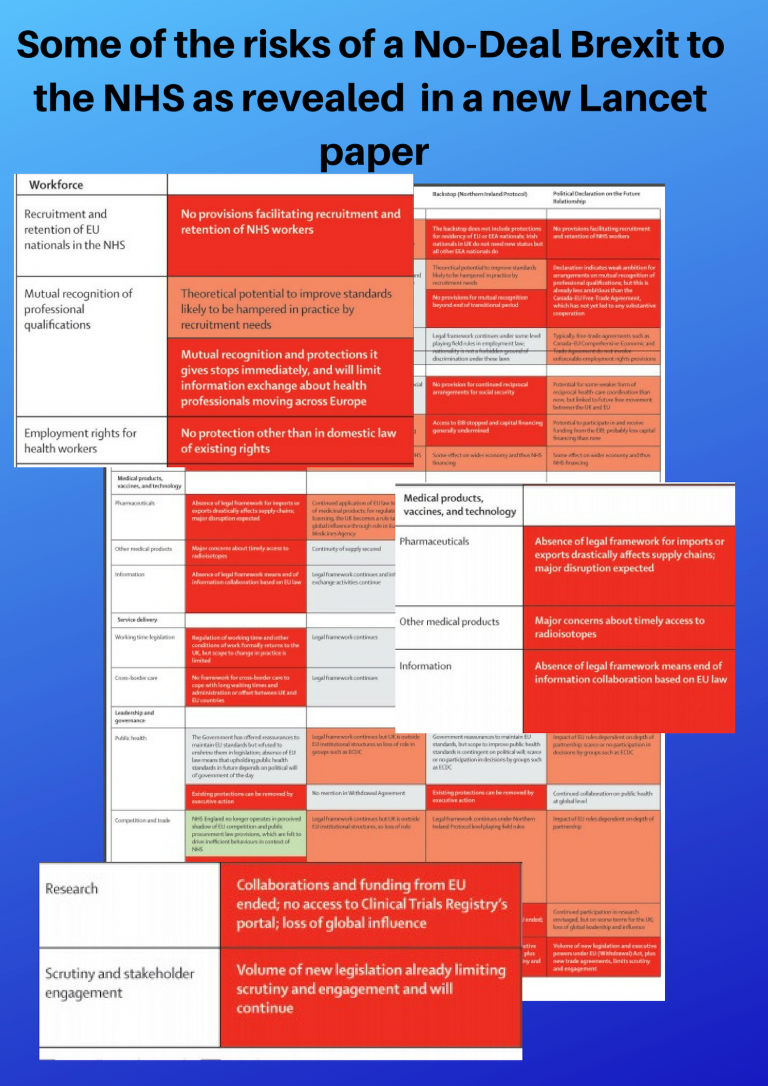Impact of Brexit on the NHS: A Critical Analysis
Written on
Chapter 1: Overview of Brexit's Threats to the NHS
A recent report from The Lancet highlights that all forms of Brexit could severely affect the NHS, with a No-Deal Brexit being the most detrimental scenario.

The health policy review published in The Lancet stresses that Brexit, especially without an agreement, threatens NHS operations, funding, workforce sustainability, and the accessibility of medications. The experts behind this analysis indicate that there is minimal evidence suggesting that the NHS or the UK is adequately prepared for the consequences of Brexit. They point to the recently issued NHS ten-year plan, which spans 136 pages yet only mentions Brexit twice, lacking specifics on implications or solutions.
While the Withdrawal Agreement between the UK Government and the EU presents a somewhat optimistic scenario compared to a No-Deal situation, concerns persist regarding Brexit's ongoing negative effects on the NHS once the transition period ends. Professor Martin McKee from the London School of Hygiene & Tropical Medicine remarks, “Some may dismiss our findings as 'Project Fear.' However, with Brexit approaching, we must look beyond catchphrases. We have detailed the issues based on the best available evidence. If there are differing opinions, those individuals owe it to the British public to explain why. Simply stating that 'things will work out' without specifics is inadequate.”
Section 1.1: Potential Scenarios
The analysis evaluates the repercussions of four possible Brexit scenarios on 15 distinct aspects of the UK health service. These scenarios include:
- A No-Deal Brexit, where the UK exits the EU without a formal agreement.
- The Withdrawal Agreement, which includes a transitional arrangement until the end of 2020.
- The Northern Ireland Protocol’s Backstop.
- The Political Declaration regarding the future relationship between the UK and the EU.
Remaining a part of the EU, while not included in this particular study, is deemed more beneficial for health than any Brexit outcome, as established in a previous paper from 2017.
Subsection 1.1.1: Workforce Challenges

Post-Brexit, recruiting and retaining healthcare professionals is a significant challenge. The Withdrawal Agreement offers reciprocal arrangements and mutual recognition of professional qualifications until 2020. However, the Backstop or Political Declaration lacks provisions for healthcare professionals. A No-Deal Brexit could impose a salary threshold of £30,000 per year, severely restricting the influx of many healthcare workers into the UK.
Under the Withdrawal Agreement, reciprocal healthcare arrangements (such as the European Health Insurance Card) would remain in effect until 2020, but there is no ongoing mechanism to sustain these agreements, though some limited bilateral accords may develop over time. Without a deal, reciprocal healthcare arrangements would cease in 2019, impacting older UK residents and individuals with pre-existing health conditions who would face high health insurance costs in the EU.
Section 1.2: Financial Implications
The availability of capital financing for NHS infrastructure through the European Investment Bank would be adversely affected across all scenarios. As public expenditure in the UK faces pressure from a decelerating economy—worsened by Brexit—funding commitments for the NHS are in jeopardy.
Under the Withdrawal Agreement, legal continuity would maintain supply chains for medicines and medical devices until 2020. However, a No-Deal Brexit would create immediate and severe disruptions in these supply chains. Despite government assurances of contingency measures, stockpiling cannot sustain shortages beyond a few weeks, and certain products, like radioisotopes, cannot be stockpiled.
Under any Brexit variant, the UK will exit the European Medicines Agency. While the Medicines and Health products Regulatory Agency in the UK will continue to license medications, the absence of regulatory alignment may deter global pharmaceutical companies from launching new drugs in the UK, potentially delaying introduction by as much as 24 months.
Professor Tamara Hervey from the University of Sheffield warns, “It's crucial to understand the practical consequences of untangling over 40 years of legal integration. This cannot be done hastily without risking public health. Future legal relationships will have significant implications for the NHS, which must be considered by the UK Government as it makes post-Brexit decisions.”
Chapter 2: The Broader Implications for Health Leadership
The video titled "RCPath Book Club - featuring The Pandemic Century (3 November 2020)" discusses the broader implications of health policy during crises, including the effects of Brexit on the UK's health leadership role.
Any form of Brexit threatens the UK's standing in European and global health leadership. The Withdrawal Agreement does not address membership in the European Centre for Disease Control, and while the Political Declaration acknowledges global public health collaboration, it overlooks European partnerships. UK legislation regarding air quality and public health standards, which derive from EU laws, may see regression as the UK has struggled to meet existing air quality benchmarks.
Dr. Nick Fahy from the University of Oxford emphasizes, “The NHS is central to our national identity; understanding Brexit's impact on it is critical. Patients and healthcare providers face growing uncertainty and potential disruptions. The NHS urgently needs clarity regarding Brexit's ramifications.”
Originally published at sciscomedia.co.uk on February 26, 2019.

? Read this story later in Journal. ? Subscribe to receive weekly updates on significant Tech stories, opinions, and news directly in your inbox: Get the noteworthy newsletter >